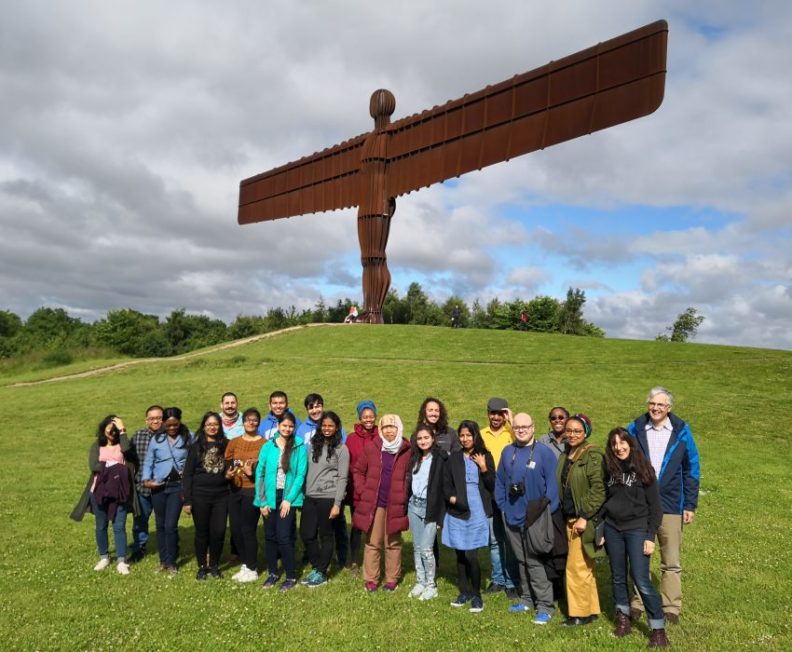Blue Mondays: Water Encounters from Lindisfarne to London

Blue Mondays: Water Encounters from Lindisfarne to London
Reflections on two Mondays involving water from a PhD candidate studying water security in South Africa
Color psychologist associate the color blue with the pale blue daytime sky or the rich dark blue of the sea. These associations lead to blue being seen as a color of calm and serenity. On the contrary, blue is also associated with sadness and distress, hence the expressions “feeling blue” which signifies sadness or “blue Monday” which signifies a dispirited return to work after a weekend.
My blog piece is about two (blue) Monday’s which offered me calming and concerning reflections about water – however with a committed and blissful return to my work after each weekend.
Exploring how water is seen, understood, valued and managed has formed the initial phase of my PhD. I cannot help but acknowledge that my relationship with water has already changed and will probably never be the same as I solider on with my PhD and career pathway. Water in its worldly flow, follows me everywhere I go; whether it be in the water I carry in a bottle, in a jug at a workshop, in a river as I look out a train or an aeroplane window, in a kettle when I boil water for a cup of Rooibos tea or in a pot to boil British potatoes – I am constantly immersed and aware of its presence in my daily activities no matter where I am.
Monday, 1 July 2019 – Lindisfarne
As part of our Global Challenges Research Fund (GCRF) activities, a guided tour to the Northeast coast of England was kindly arranged for our cohort. We took a bus ride from Durham through some of the coastal cities (Tynemouth, Cullercoats, Whitley Bay and Bamburg) right through to Lindisfarne, where we took a boat ride to the Farne Islands; an internationally recognized nature reserve and sea bird sanctuary. While on our boat ride to the Farne Islands, I gazed at the sea water surrounding us with “new eyes”. I thought about the strength of the currents and their ability to destroy and take lives while momentously giving life to the vast marine life and seabed. I thought about the absence of water and the reality it forebears on exacerbating poverty and access to adequate sanitation for millions of people across the world. I thought about how the abundance of water in sight is also an issue of marine conservation clouded with the complexities of climate uncertainty and water governance. As I reflect on the day and see the picture taken by one of my GCRF colleagues, I am captured by waters service to us on that day – carrying the weight of the boat and the people on it, affording us a leisurely adventure to the Farne Islands.
Without water this experience would have not been the same.

Monday, 8 July 2019 – London
So here I am one week later on the London tube making my way to a summer school training session on research methods. Surrounded by a sea of London commuters, I do the seemly routine phone, people and tube map gaze. As I look up towards the tube map, a Lipton advertisement catches my attention. It reads; “water, the only thing more boring than your commute; jazz up your water with real iced tea”. I read it a couple of times to the point where I decided to take a picture of it.
Having read so much about the importance of water over the past 6 months, this advertisement inherently espoused some emotion. I asked myself if water is really boring and thought, well maybe it is, because it just forms part of daily lives and we may not be fully aware of its intriguing attributes. A 2017 study conducted by Attest (a consumer research organization), shows that the top three emotions people feel when on the tube are; frustration, exhaustion and boredom. In this light, I can see why Lipton opted for this language in their advertisement. Nonetheless, as a water researcher on the tube that day I felt blue when I thought about the fact that…
Without water, there would be nothing to “jazz up”

These contrasting encounters with water from Lindisfarne to London, show how water’s role in everyday life is unavoidable, it was present in the calm and in the chaos, serving us in visible and invisible ways. It served us as tourists to the Farne Island and served “bored” tube commuters something to read/think about. With its multiple roles, flows and services in our daily lives, water cuts across several Sustainable Development Goals, playing a central part in reducing poverty and enabling socio-economic development. With water so much is possible. Can you imagine life without water?
As water users we ought to consciously value water as a life-giving, thought-provoking, adventure enabling and fascinating resource.
Phellecitus Thuli Montana
header photo by Daniele Levis Pelusi on Unsplash

